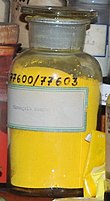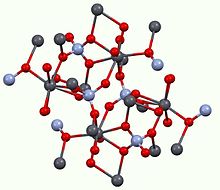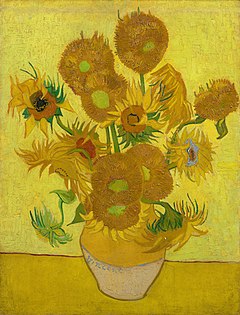 | |
 | |
| Names | |
|---|---|
| Other names see text | |
| Identifiers | |
| CAS Number | |
| ChEBI | |
| ECHA InfoCard | 100.028.951 |
| EC Number |
|
| PubChem CID | |
| RTECS number |
|
| UNII | |
| UN number | 3288 |
| CompTox Dashboard (EPA) | |
| Properties | |
| Chemical formula | PbCrO4 |
| Molar mass | 323.192 g/mol |
| Appearance | bright yellow powder |
| Density | 6.12 g/cm, solid |
| Solubility in water | 0.00001720 g/100 mL (20 °C) |
| Solubility | soluble in diluted nitric acid insoluble in acetic acid, ammonia |
| Magnetic susceptibility (χ) | −18.0·10 cm/mol |
| Refractive index (nD) | 2.31 |
| Structure | |
| Crystal structure | monoclinic |
| Hazards | |
| Occupational safety and health (OHS/OSH): | |
| Main hazards | Carcinogen and moderately toxic |
| GHS labelling: | |
| Pictograms |  
|
| Signal word | Danger |
| Hazard statements | H350, H360, H373, H410 |
| Precautionary statements | P201, P273, P308+P313, P501 |
| NFPA 704 (fire diamond) |
 |
| Lethal dose or concentration (LD, LC): | |
| LD50 (median dose) | >12 g/kg (mouse, oral) |
| Safety data sheet (SDS) | ICSC 0003 Sigma-Aldrich |
| Except where otherwise noted, data are given for materials in their standard state (at 25 °C , 100 kPa).
| |
Lead(II) chromate is an inorganic compound with the chemical formula PbCrO4. It is a bright yellow solid that is very poorly soluble in water. It occurs also as the mineral crocoite. It is used as a pigment.
Structure

Two polymorphs of lead chromate are known, orthorhombic and the more stable monoclinic form. Monoclinic lead chromate is used in paints under the name chrome yellow, and many other names. Lead chromate adopts the monazite structure, meaning that the connectivity of the atoms is very similar to other compounds of the type MM'O4. Pb(II) has a distorted coordination sphere being surrounded by eight oxides with Pb-O distances ranging from 2.53 to 2.80 Å. The chromate anion is tetrahedral, as usual. Unstable polymorphs of lead chromate are the greenish yellow orthorhombic form and a red-orange tetragonal form.
Applications

Approximately 37,000 tons were produced in 1996. The main applications are as a pigment in paints, under the name chrome yellow.
Preparation
Lead(II) chromate can be produced by treating sodium chromate with lead salts such as lead(II) nitrate or by combining lead(II) oxide with chromic acid.
Related lead sulfochromate pigments are produced by the replacement of some chromate by sulfate, resulting in a mixed lead-chromate-sulfate compositions Pb(CrO4)1−x(SO4)x. This replacement is possible because sulfate and chromate are isostructural. Since sulfate is colorless, sulfochromates with high values of x are less intensely colored than lead chromate. In some cases, chromate is replaced by molybdate.
Reactions
Heating in hydroxide solution produces chrome red, a red or orange powder made by PbO and CrO3. Also, in hydroxide solution lead chromate slowly dissolves forming plumbite complex.
- PbCrO4 + 4 OH → [Pb(OH)4] + CrO2−4
Safety hazards
Despite containing both lead and hexavalent chromium, lead chromate is not acutely lethal because of its very low solubility. The LD50 for rats is only 5,000 mg/kg. Lead chromate must be treated with great care in its manufacture, the main concerns being dust of the chromate precursor. Lead chromate is highly regulated in advanced countries. As one of the greatest threats comes from inhalation of particles, so much effort has been devoted to production of low-dust forms of the pigment.
In the 1800s, the product was used to impart a bright yellow color to some types of candy. It is used (illegally) to enhance the color of certain spices, particularly turmeric, particularly in Bangladesh.
Unlike other lead-based paint pigments, lead chromate is still widely used, especially in road marking paint.
In 2023 and 2024, consumption of adulterated cinnamon led to at least 136 cases of lead toxicity in children in the United States as reported by the US Centers for Disease Control and Prevention. The affected products were recalled. The US Food and Drug Administration determined that the ratio of lead to chromium in the cinammon indicated that lead chromate had been added to the cinnamon.
See also
References
- Lide, David R., ed. (2006). CRC Handbook of Chemistry and Physics (87th ed.). Boca Raton, Florida: CRC Press. ISBN 0-8493-0487-3.
- ^ Erkens, LJH; Hamers, H.; Hermans, RJM; Claeys, E.; Bijnens, M. (2001). "Lead chromates: A Review of the State of the Art in 2000". Surface Coatings International Part B: Coatings Transactions. 84 (3): 169–176. doi:10.1007/BF02700395. S2CID 94606296.
- Quareni, S.; de Pieri, R. "A Three-Dimensional Refinement of the Structure of Crocoite, PbCrO4" Acta Crystallographica 1965, volume 19, p287-p289. doi:10.1107/S0365110X65003304
- "Sunflowers - Van Gogh Museum". vangoghmuseum.nl. Archived from the original on 29 October 2016. Retrieved 21 September 2016.
- Monico, Letizia; Janssens, Koen; Hendriks, Ella; Vanmeert, Frederik; Van Der Snickt, Geert; Cotte, Marine; Falkenberg, Gerald; Brunetti, Brunetto Giovanni; Miliani, Costanza (2015). "Evidence for Degradation of the Chrome Yellows in Van Gogh's Sunflowers: A Study Using Noninvasive In Situ Methods and Synchrotron-Radiation-Based X-ray Techniques". Angewandte Chemie International Edition. 54 (47): 13923–13927. doi:10.1002/anie.201505840. PMID 26482035. S2CID 2268072.
- ^ Völz, Hans G.; et al. (2006). "Pigments, Inorganic". Ullmann's Encyclopedia of Industrial Chemistry. Weinheim: Wiley-VCH. doi:10.1002/14356007.a20_243.pub2. ISBN 978-3-527-30673-2.
- Wisconsin. State Board of Health (1887). Progress Report of Public Health in Wisconsin, Volume 10. p. 92. Retrieved 17 July 2013. (Google Books)
- "The American Spice Trade Association's Statement on Lead in Turmeric - ASTA: The Voice of the U.S. Spice Industry in the Global Market". ASTA: The Voice of the U.S. Spice Industry in the Global Market. 28 October 2013. Retrieved 21 November 2018.
- Angelon-Gaetz, Kim A.; Klaus, Christen; Chaudhry, Ezan A.; Bean, Deidre K. (23 November 2018). "Lead in Spices, Herbal Remedies, and Ceremonial Powders Sampled from Home Investigations for Children with Elevated Blood Lead Levels — North Carolina, 2011–2018". MMWR. Morbidity and Mortality Weekly Report. 67 (46): 1290–1294. doi:10.15585/mmwr.mm6746a2. ISSN 0149-2195. PMC 6289082. PMID 30462630.
- "Researchers find lead in turmeric". Phys. Stanford University. 24 September 2019. Retrieved 1 October 2019.
- Forsyth, Jenna E.; Nurunnahar, Syeda; Islam, Sheikh Shariful; Baker, Musa; Yeasmin, Dalia; Islam, M. Saiful; Rahman, Mahbubur; Fendorf, Scott; Ardoin, Nicole M.; Winch, Peter J.; Luby, Stephen P. (December 2019). "Turmeric means "yellow" in Bengali: Lead chromate pigments added to turmeric threaten public health across Bangladesh". Environmental Research. 179 (Pt A): 108722. Bibcode:2019ER....179j8722F. doi:10.1016/j.envres.2019.108722. PMID 31550596.
- "Lead Chromate: Why it is Banned in Most Industries Apart From Road Markings". Road Traffic Technology. Verdict Media Limited. Retrieved 2024-05-27.
- ^ "Investigation of Elevated Lead & Chromium Levels: Cinnamon Applesauce Pouches (November 2023)". Food and Drug Administration. 16 April 2024. Retrieved 27 May 2024.
- "Lead and Chromium Poisoning Outbreak Linked to Cinnamon Applesauce Pouches". 17 April 2024. Retrieved 27 May 2024.
| Lead compounds | |
|---|---|
| Pb(II) | |
| Pb(II,IV) | |
| Pb(IV) | |
| Chromates and dichromates | |||||
|---|---|---|---|---|---|
| Chromates |
| ||||
| Dichromates | |||||
| Related | |||||